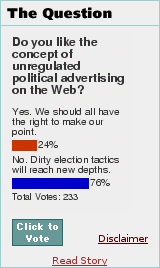 76% say “No. Dirty election tactics will reach new depths.” in a San Francisco Chronicle online poll (no permalink, see image at right).
76% say “No. Dirty election tactics will reach new depths.” in a San Francisco Chronicle online poll (no permalink, see image at right).
The article linked from the poll concerns a video mashup of Apple’s 1984 advertisement with Hillary Clinton as Big Brother and Barack Obama as Apple.
Fortunately the article does not mention calls to suppress speech, but they will doubtless come as this form becomes more important and opportunists see polls such as the above. It may have been possible to suppress speech in the broadcast media without tremendous collateral damage. On the net, I doubt it.
Hillary 1984 works about as well as the original and captures Clinton saying nothing. But neither ad works for me — both scream “same as the old boss.” The woman with the sledgehammer needed inside help to get so close and is either part of an elite faction or the dupe of one. Apple is just another proprietary vendor and I’m sure Obama can say nothing as well as any politician.
For the record I prefer Obama over Clinton though Bill Richardson is my preferred Democrat candidate for temporary dictator of the U.S.
I hate John Edwards (the whine plus the drawl really gets at me), but in truth it’s a narrow field.
